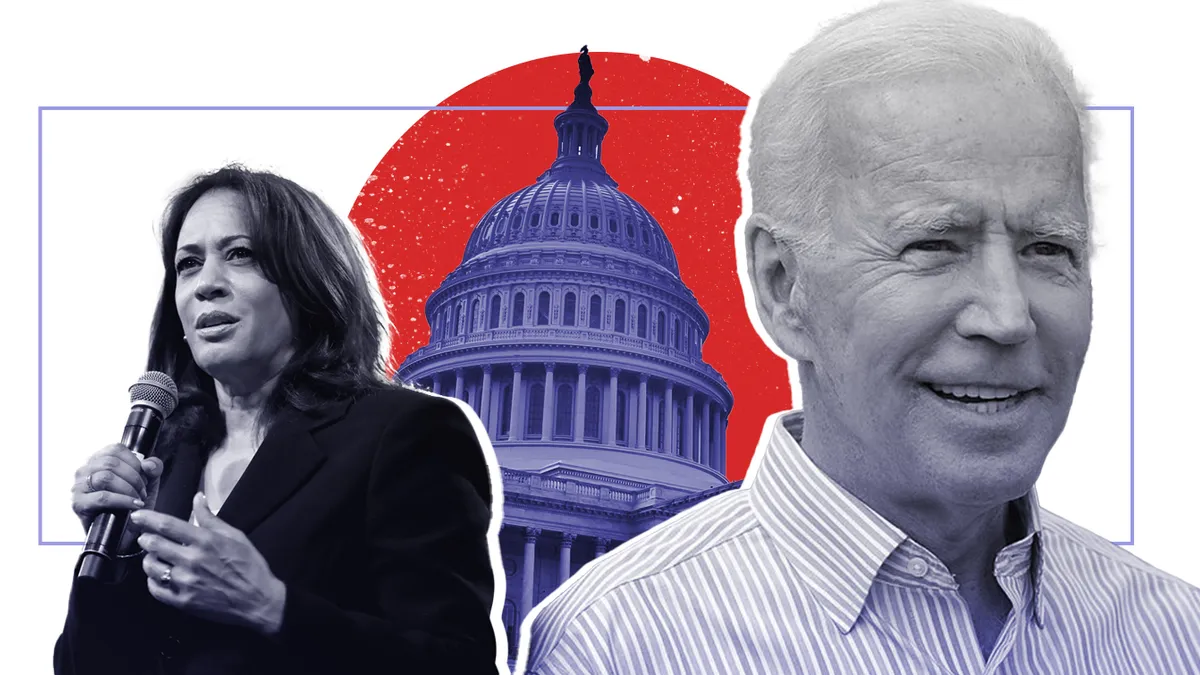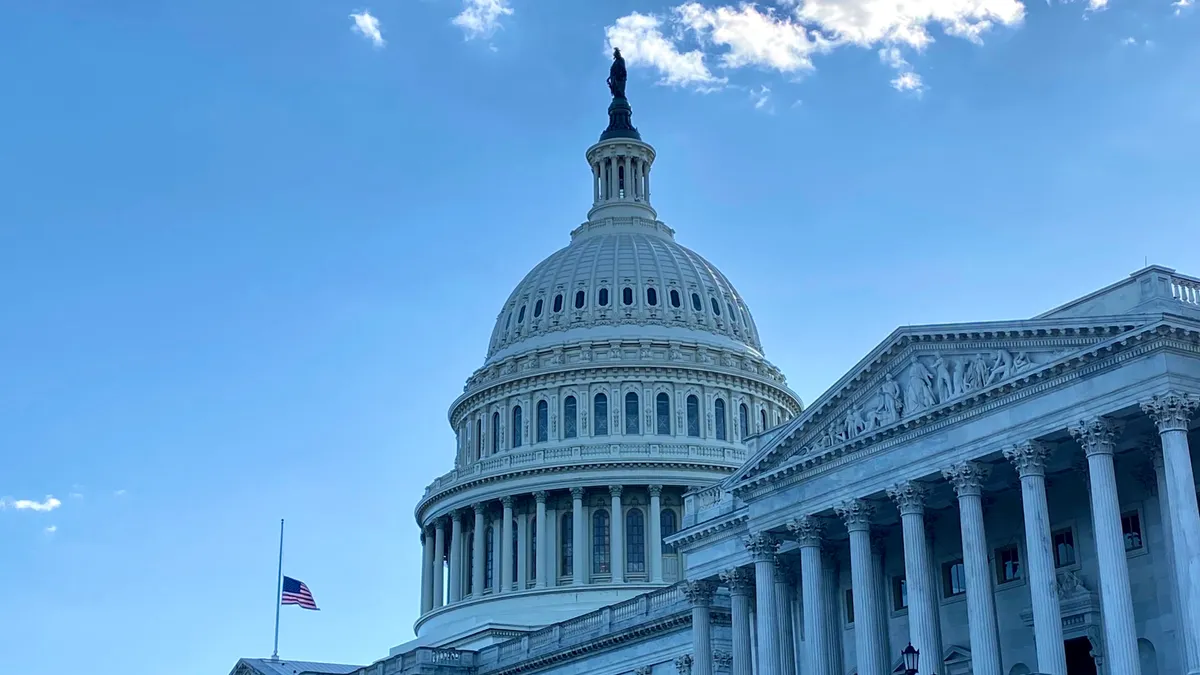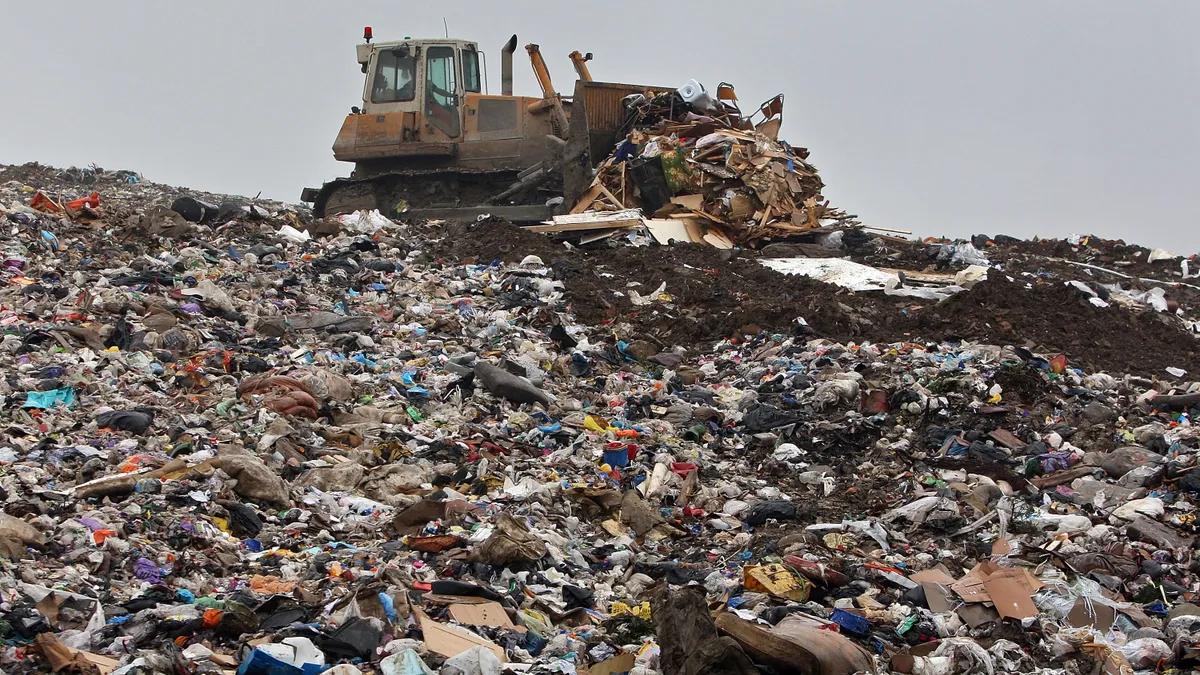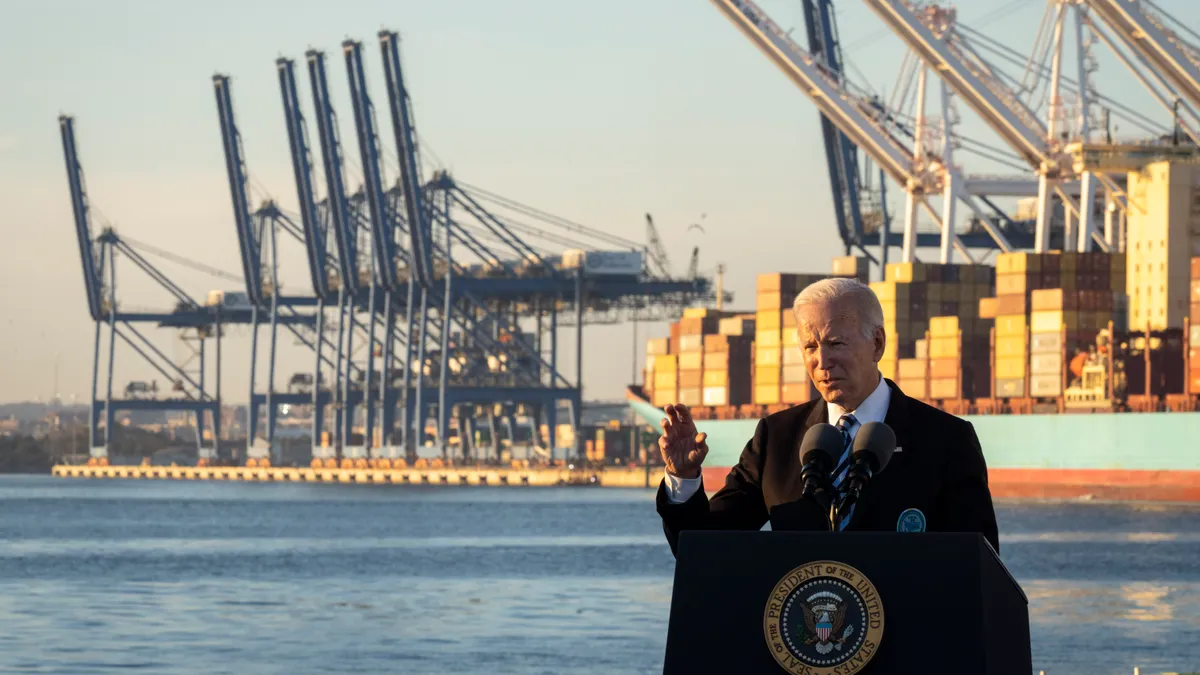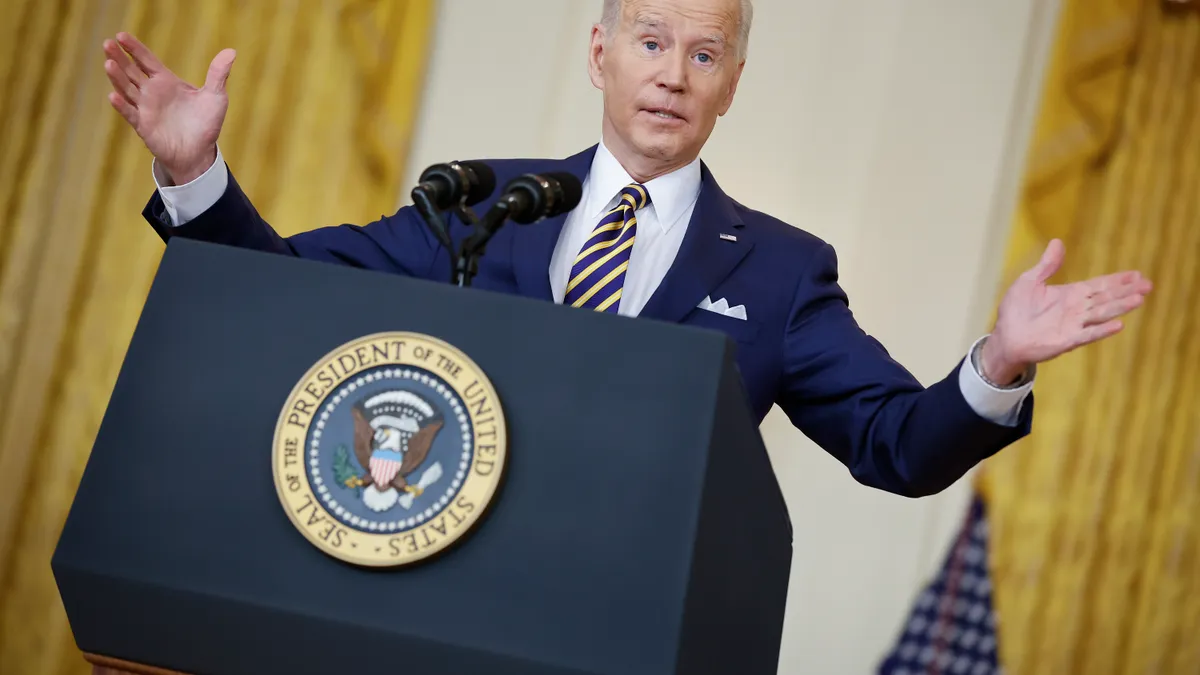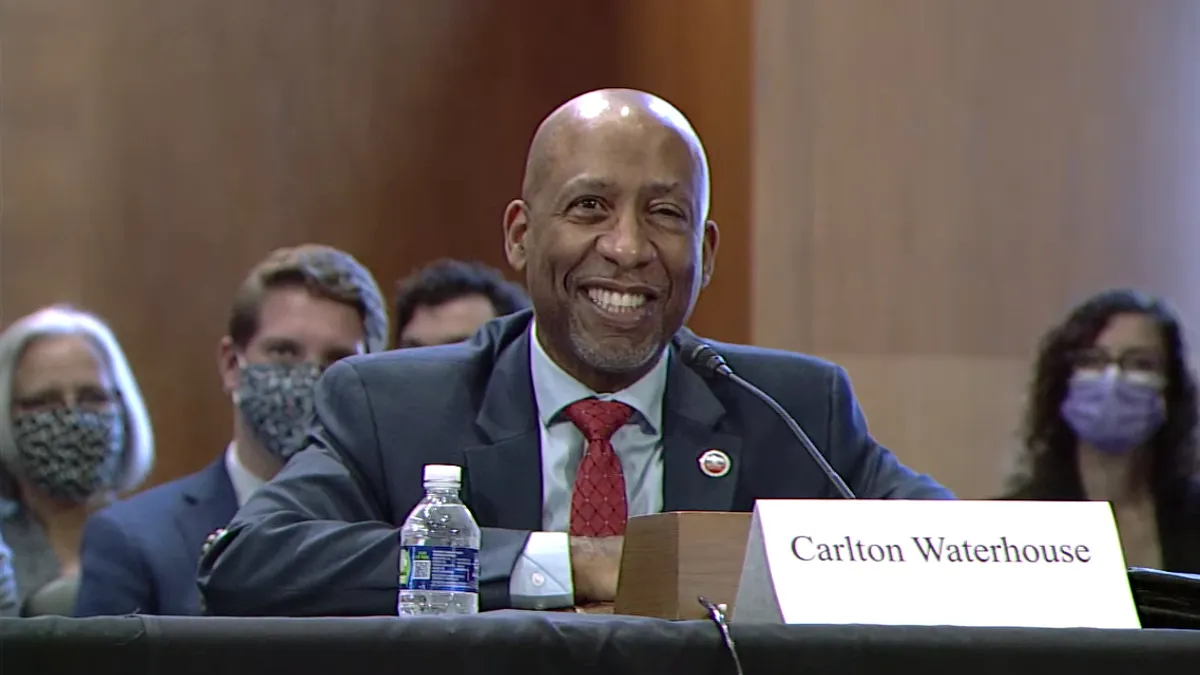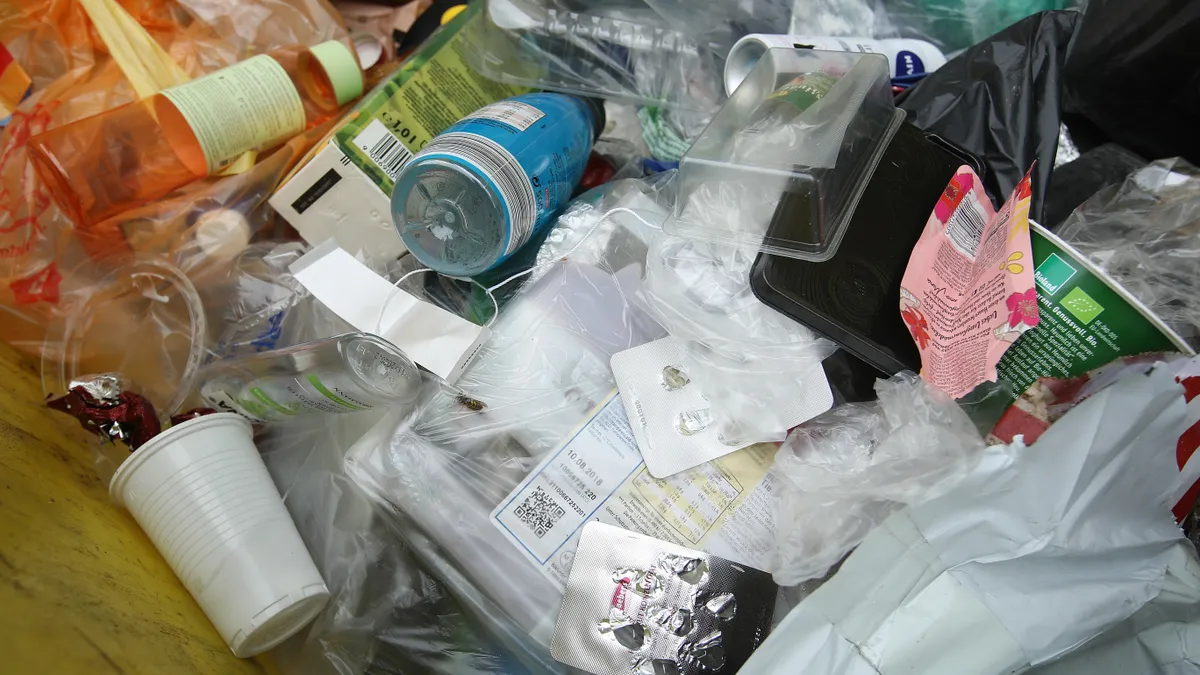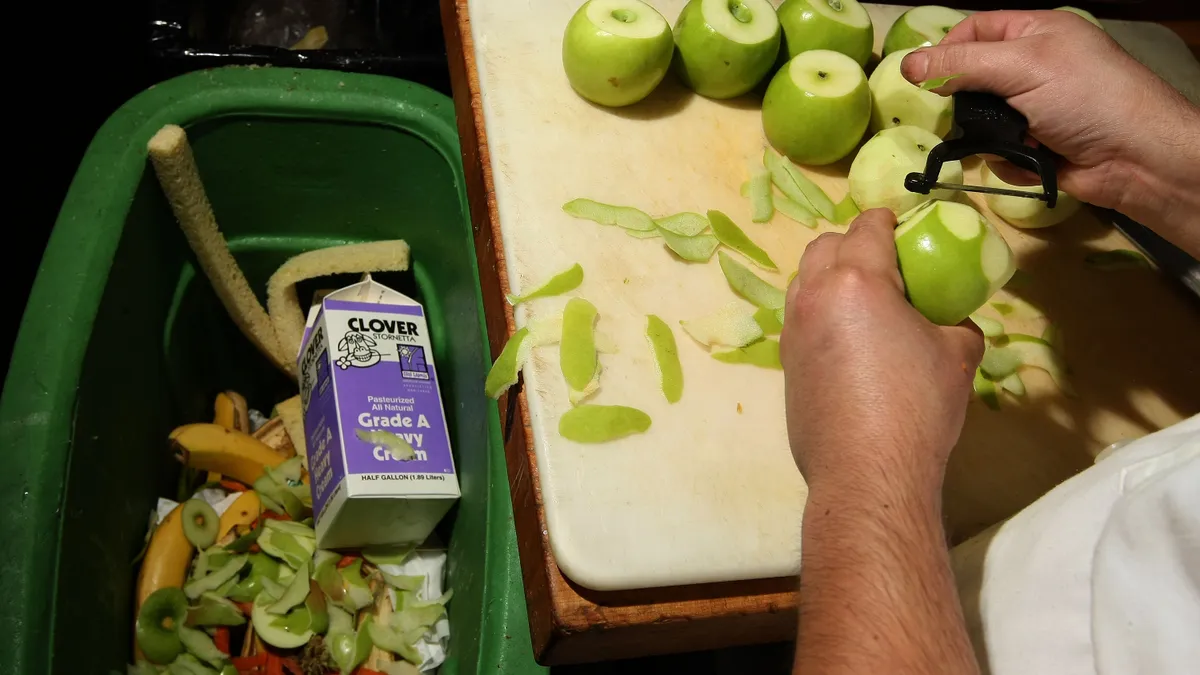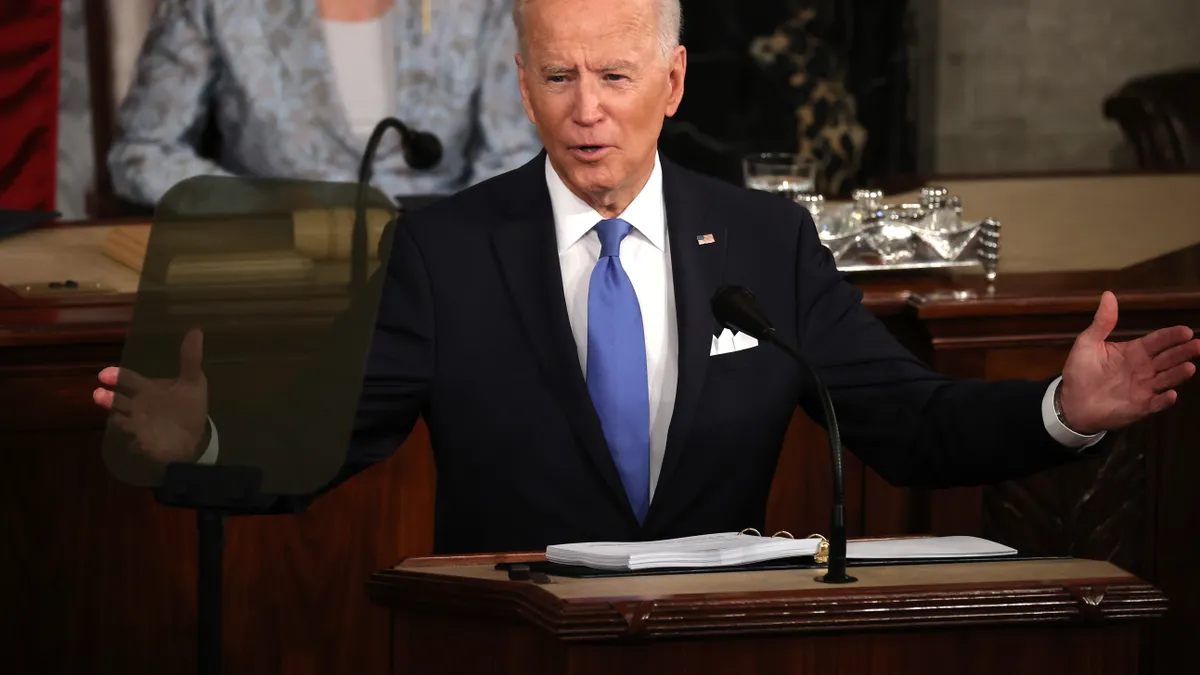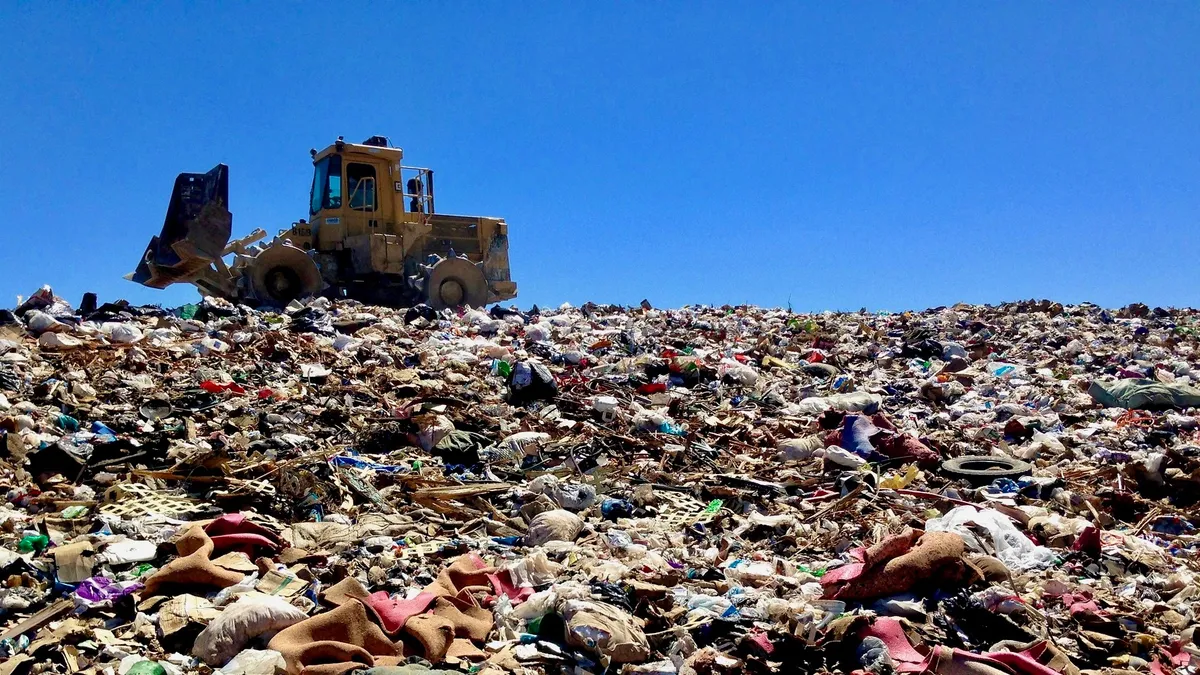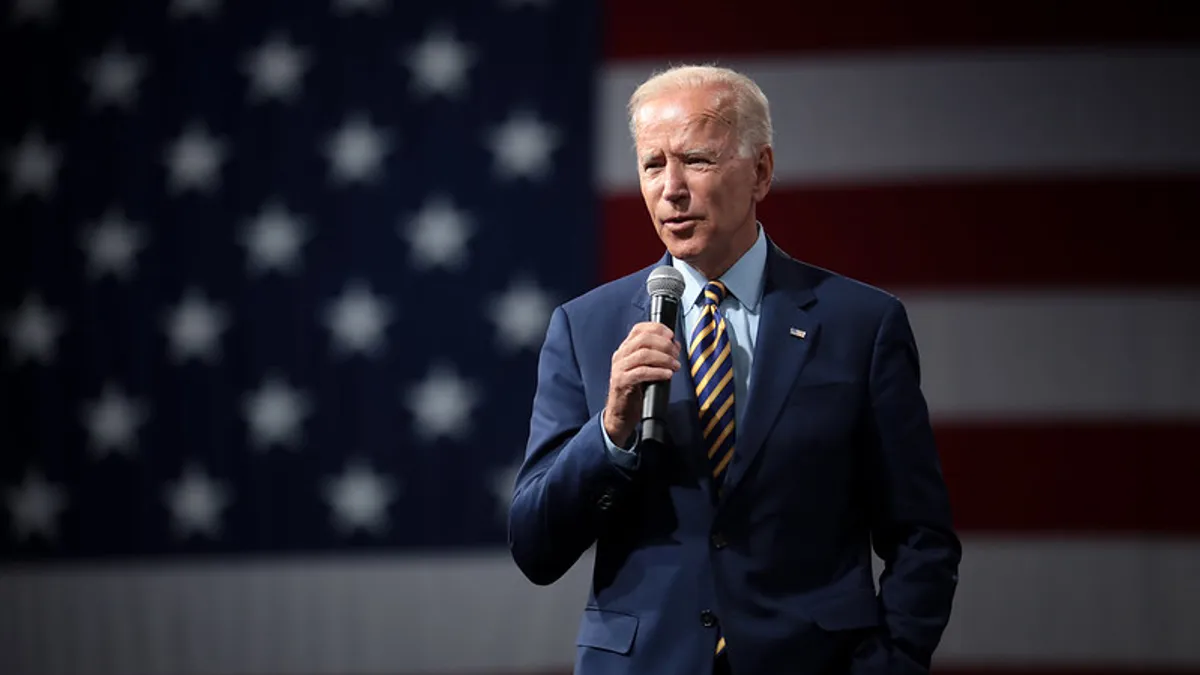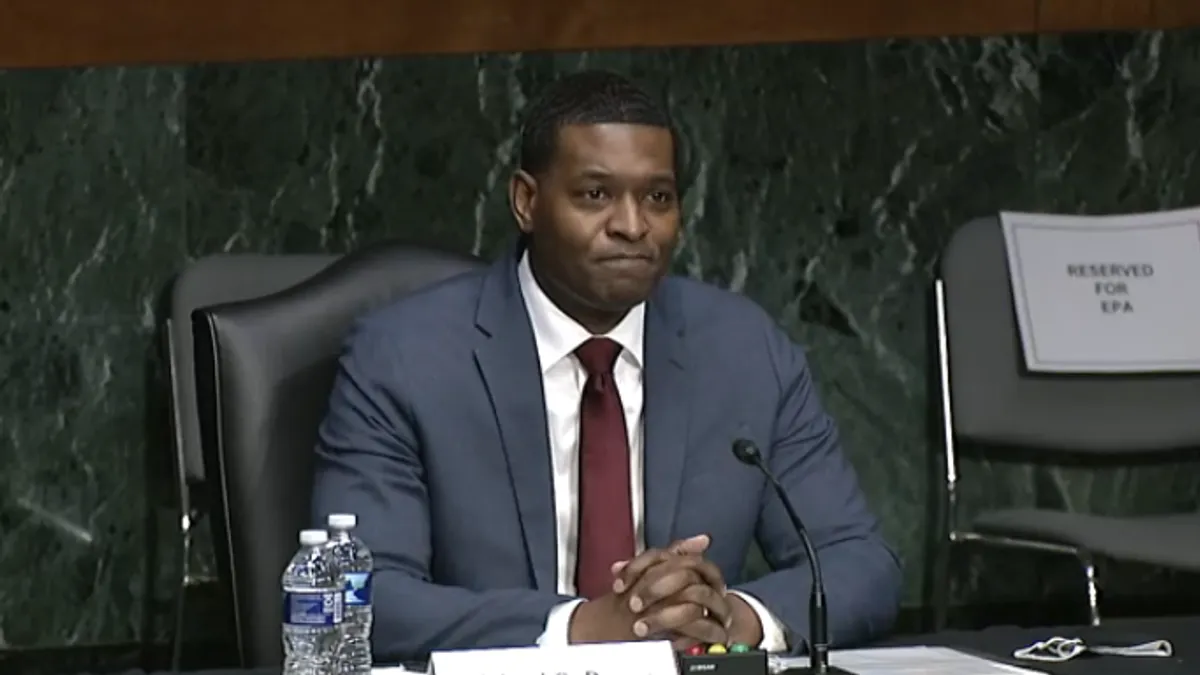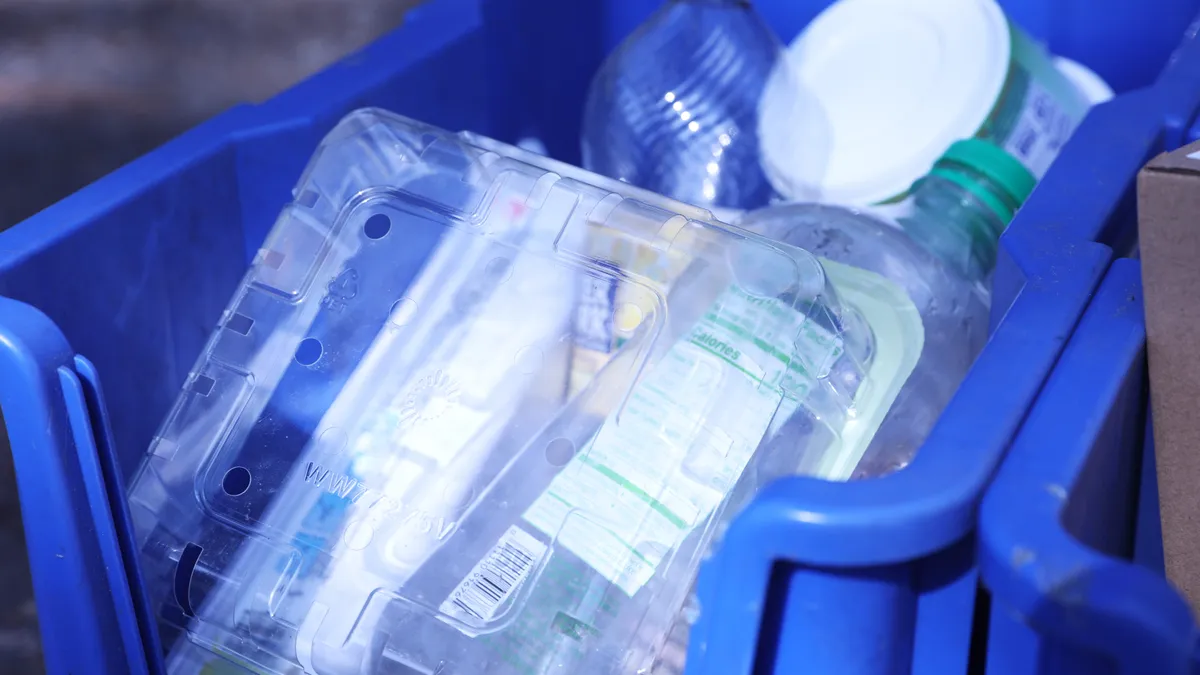This story is part of the Waste Dive Outlook on 2021, a series on the trends that will shape the industry in 2021. For a look at the business trends affecting other industries, see the Dive Outlook on 2021.
Federal interest in addressing the nation's recycling challenges remains high, but even with new leadership in the Biden administration and Congress, the recycling industry does not expect big changes to come this year.
The Biden administration’s first environmental priorities are geared more toward broader climate change policy, environmental justice and designating per- and polyfluoroalkyl substances (PFAS) – sometimes known as “forever chemicals” – as hazardous substances. In Congress, recycling-related bills that didn’t gain traction in 2020 are expected to return, but bandwidth is low as Congress focuses on former President Donald Trump’s impeachment trial and issues related to the Jan. 6 insurrection at the U.S. Capitol, as well as the ongoing COVID-19 pandemic.
“This will be a year to see a lot of [recycling-related] activity, but I’m not certain I’ll see a lot of action because of other priorities these legislators have,” said David Biderman, executive director and CEO of the Solid Waste Association of North America (SWANA).
Recycling bills expected to return
The discussion over how to improve issues with the domestic recycling system has made its way to Congress over the last few years, in part because scrap import bans in China and other Southeast Asian countries significantly changed the flow and economics of materials in the U.S.
It has come in the form of several bills that could tackle recycling infrastructure improvements, public education and end markets. Industry groups and lawmakers have different views about which of these issues is the most important way to approach the problem.
The Break Free From Plastic Pollution Act, which Rep. Alan Lowenthal (D-Calif.) and then-Sen. Tom Udall (D-N.M.) introduced in 2020, calls for extended producer responsibility (EPR) and product stewardship for packaging, plastic bans or reduction efforts and a nationwide 10-cent beverage container deposit program.
This bill is likely to “return with a vengeance” in 2021, said Heidi Sanborn, executive director of the National Stewardship Action Council. The new Democratic majority in the Senate could have a role to play in helping it move forward in Congress, along with several environmental groups that championed the bill last year and voters "who voted for Biden in part because of the environment and his views on climate change."
Judith Enck, former U.S. EPA regional administrator and president of the nonprofit Beyond Plastics, said the bill stands out from other recently floated recycling-related proposals floated because it is "the only serious bill that actually includes provisions to reduce the production, use and disposal of plastics."
The bill will still need to gain a new Senate sponsor after Udall’s retirement at the end of 2020. Lowenthal, along with Rep. Katherine Clark (D-Mass.) and Sen. Jeff Merkley (D-Ore.) announced they plan to reintroduce the bill in the new Congress.
Democrats have a small majority in the House and share half the power in the Senate – with a tie-breaking vote from Vice President Kamala Harris – meaning they may need to make some concessions or temper this or other bills' provisions to help bring Republicans on board, said Jim Riley, the National Waste & Recycling Association's (NWRA) chief counsel and senior vice president of government affairs. However, two other bills expected to be reintroduced in 2021 received bipartisan support.
One is the RECYCLE Act, sponsored last year by Sens. Rob Portman (R-Ohio) and Debbie Stabenow (D-Mich.). The bill aimed to improve recycling education and outreach by authorizing up to $15 million a year in grants for entities such as states and local governments, tribes and nonprofits. It also asked the EPA to more frequently update its guidelines for products containing recycled content. The Institute of Scrap Recycling Industries (ISRI), the NWRA and SWANA endorsed the bill last year, saying it could help increase recycling participation and make recycling streams cleaner.
Another bill that could return is the RECOVER Act. Introduced by Reps. Tony Cárdenas (D-Calif.) and Larry Bucshon (R-Ind.) last year, it was meant to boost infrastructure projects through up to $500 million in matching grants for improvements to MRFs and curbside collection systems. The bill also aimed to establish a recycling infrastructure program within the EPA.
When introduced, industry groups had mixed reactions. ISRI said the bill focused too much on solving infrastructure problems instead of working on improving end markets for the material that moves through the system, or educating the public about what should or should not go in the recycling bin in the first place, said Billy Johnson, the trade association's chief lobbyist. SWANA, on the other hand, said it was important to support both education efforts through bills like RECYCLE as well as the infrastructure elements outlined in RECOVER.
Biderman said said the recycling industry expects other recycling-related legislation to be introduced this year, based on discussions with stakeholders, and "will review such legislation if it is formally introduced.”
Some new legislation may call for increasing incentives for domestic recycling capabilities, Riley said. This may show up in its own bill or as part of a broader infrastructure package, he said. “I think the past year with COVID is highlighting the need for a domestic supply chain. The markets are already coming online naturally, but there should also be incentives for that.”
Groups like The Recycling Partnership also expect to see more “engagement from Congress with new legislation in 2021,” particularly around funding for expanding existing recycling systems, CEO Keefe Harrison said during a panel discussion with Axios and the American Chemistry Council in December.
Even if these bills don’t become law by the end of the year, lawmakers are motivated to keep recycling efforts within sight because their constituents care about having reliable recycling systems and will keep pressure on their elected officials to make it happen, Johnson said. The public’s awareness of the recycling industry’s importance – and its problems – has increased since the COVID-19 pandemic began, when some curbside programs were suspended, and lawmakers feel pressure to assure their constituents that they are working on fixing broken pieces of the system, he said.
Recyclers are considered essential workers by the federal government and many states, said Johnson, “which helped people start to have another view of why recycling is important now, and that official designation of being an essential business in the supply chain raised awareness of recycling even more.”
Many recycling-related bills were postponed at the state level last year, in part because of the pandemic, but lawmakers have an opportunity to move more quickly on these issues this legislative session, said Anne Germain, NWRA’s chief operating officer and senior vice president of technical and regulatory affairs. Several states have already introduced EPR bills for packaging or could introduce legislation to increase minimum recycled content standards.
“Even though there is a lot happening on the federal level with respect to recycling, the state level is where we are expecting the bigger changes to occur,” she said.
Biden administration’s focus on environmental justice, PFAS
The Biden administration has been clear about its plans to focus on climate and clean energy initiatives, including rejoining the Paris climate agreement.
It has not yet announced plans or strategies specific to recycling, though a group of community and environmental advocacy groups recently called on Biden to enact plastic recycling-related initiatives such as creating an office for recycling market development and waste reduction and appointing a plastic pollution czar.
One pressing issue the administration does plan to tackle is environmental justice, noting that “communities of color and low-income communities have faced disproportionate harm from climate change and environmental contaminants for decades.” This renewed federal-level focus on the issue follows recent environmental justice-related efforts that have passed at the state level.
Industry groups such as ISRI, SWANA and NWRA are taking note. NWRA added a new environmental justice policy position to its 2021 federal legislative and regulatory agenda, saying it “supports policies seeking to advance high standards of environmental performance and the fair treatment of people of all races, cultures and incomes.”
SWANA says it is having long-term discussions with members about the role the recycling industry can play in the environmental justice discussion. “Solid waste facilities seek to have a minimal impact on the communities they serve, and we will continue to work with government officials and the industry to minimize those impacts,” Biderman said.
Johnson anticipates some lawmakers might also weave environmental justice-related wording into climate and recycling bills to align their efforts with the new focus on the topic. “They may be changing some of the marketing of their bills… to say they don’t want to inflict an environmental injustice,” he said.
The Biden administration has also indicated it plans to address PFAS. Recyclers don’t generate PFAS, but they likely receive PFAS-laden items at their MRFs and other processing facilities. Although recent EPA guidance on PFAS disposal relates most directly to landfills and incinerators, Adina Renee Adler, ISRI’s vice president of advocacy, said ISRI and other recycling organizations are keeping track of what any future guidance might mean for the recycling industry.
The Biden administration has said it plans to designate the chemicals as a hazardous substance and set enforceable limits for PFAS in the Safe Drinking Water Act. There are currently no maximum contaminant levels established for PFAS chemicals, according to the EPA.
PFAS is a class of over 2,000 chemicals, with two, PFOS and PFOA, garnering the most attention, said James Jones, former assistant administrator at the EPA’s Office of Chemical Safety and Pollution Prevention, during a recent panel discussion with waste haulers and investment firm Jefferies.
“I am confident that EPA will determine [PFOS and PFOA] will become hazardous substances in the next two years, making them regulated contaminants,” he said. It’s unclear how the other chemicals in the class could be treated, he said.
Industry eyes new EPA leadership
Other regulatory or policy changes that could take place at the EPA may come after the pending confirmation of Michael Regan as the new administrator.
Regan, the secretary of North Carolina’s Department of Environmental Quality, is known for his work heading up an Environmental Justice and Equity Advisory Board, and he is expected to continue supporting environmental justice efforts in his new role, Adler said. He is also known for negotiating cleanup efforts of the Cape Fear River, which had been contaminated with PFAS. It’s too early to say what other ideas or priorities Regan may bring to the office, but “he has strong credentials and is known for being collaborative,” Adler said.
Recyclers are also interested to see who might step into the assistant administrator role in the EPA's Office of Land and Emergency Management. “Whoever it is will be a key player, and knowing that person’s priorities in solid waste, and recycling in particular, will be important,” Biderman said.
Recycling industry associations say it’s critical to build strong relationships with the new EPA leadership because it provides a way to offer feedback and data that could affect major federal recycling policy. The EPA’s draft National Recycling Strategy is one example, Biderman said.
SWANA enjoyed good relationships with former Assistant Administrator Peter Wright, former Administrator Andrew Wheeler and their staff, Biderman said, making it possible for them to provide “substantial input” when the EPA was writing its draft “and it’s my hope we have similar access and input with the new administrator’s team."
The draft National Recycling Strategy, which the EPA is expected to finalize soon, includes priorities such as reducing contamination in the recycling stream, improving domestic markets for recyclables and increasing processing efficiency. A major goal is to increase the national recycling rate to 50% by 2030, through metrics that have not been fully defined.
ISRI has asked the EPA to clarify language in the draft and define key words to better differentiate between waste and recyclable commodities, and it urges the federal government to purchase more goods that are made from recycled content. The strategy has not yet been finalized, “so we have had no signals about whether or not the new administration will continue that work,” Adler said, but ISRI sees the draft document as a good start for guiding future U.S. recycling policy. “The new administration could come in with good ideas, too,” she said.
Germain said the EPA “worked hard to establish a framework that is inclusive to stakeholders” and she doesn’t expect many surprises when the final plan comes out. NWRA pushed for the document to include more details on how the country will achieve the 50% recycling goal, “which we do not think could be achieved on a voluntary basis,” she said. NWRA believes “legislative intercession” could help the U.S. get there, along with strategies such as mandatory minimum recycled content standards.
It is too early to tell how – and how immediately – the recycling strategy could influence change. Jones predicts the federal government, “a huge purchaser of a range of products,” could update its federal purchasing requirements to reflect more recycled products sometime during Biden’s term in office.
Though it's unclear how much traction recycling legislation will have in Congress in 2021, Germain said the recycling sector will still try to move forward with its goals in 2021, whether through state-level actions or by working closely with the EPA.
"The previous administration's EPA was a big proponent of recycling, and we expect the new administration to be, too. You hear how recycling is as American as mom and apple pie," she said. Among manufacturers, stakeholders and lawmakers, "you're hard-pressed to find someone opposed to recycling. It's just a matter of how much attention it gets."



